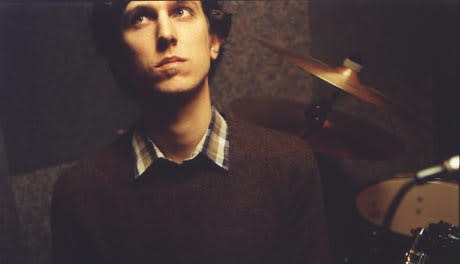Tony Dekker takes acoustics very seriously. His haunting, sombre ballads emit an otherworldly quality, due in no small part to the natural environment in which they're captured. His self-titled debut as Great Lake Swimmers was notoriously recorded in a grain silo, so it's no surprise that his follow-up, Bodies and Minds, follows suit. "It was recorded in an old church on the beach near where I grew up called Saint Teresa's. It was a much quieter space; there was nothing to deal with other than the odd car going by."
Natural reverb and folkie arrangements complement Dekker's soft voice perfectly, sure to draw similar comparisons to his debut (Will Oldham, Mark Kozelek). "The first album, I went into completely blind. I didn't know any of [those artists]. I understand why people compare things it helps create a narrative, and it gives people context. And I'd like to think that there's some kind of collective subconscious that we're all drawing from."
Despite creating a quiet, melancholic listening experience, Dekker's first passion was punk. "Punk music doesn't necessarily have to be loud and heavy. It's more the ethic that anyone can do this: pick up a guitar, play, write songs, get your point across. Growing up on a farm, I did hear a lot of country music, so that's in my bones too. Country and punk rock are not really that different."
Although the instrumentation is fuller, the fragile beauty of his songs remains. Dekker's music has always touched on themes of duality love and pain, nature and modernity and the struggle to achieve balance. "It's the disparity between being human and being a human animal, finding a type of holiness in the harshness of nature. Those are probably the two main themes that I'd like to think run through the album. Not just a connection, but a respect for nature."
Natural reverb and folkie arrangements complement Dekker's soft voice perfectly, sure to draw similar comparisons to his debut (Will Oldham, Mark Kozelek). "The first album, I went into completely blind. I didn't know any of [those artists]. I understand why people compare things it helps create a narrative, and it gives people context. And I'd like to think that there's some kind of collective subconscious that we're all drawing from."
Despite creating a quiet, melancholic listening experience, Dekker's first passion was punk. "Punk music doesn't necessarily have to be loud and heavy. It's more the ethic that anyone can do this: pick up a guitar, play, write songs, get your point across. Growing up on a farm, I did hear a lot of country music, so that's in my bones too. Country and punk rock are not really that different."
Although the instrumentation is fuller, the fragile beauty of his songs remains. Dekker's music has always touched on themes of duality love and pain, nature and modernity and the struggle to achieve balance. "It's the disparity between being human and being a human animal, finding a type of holiness in the harshness of nature. Those are probably the two main themes that I'd like to think run through the album. Not just a connection, but a respect for nature."
